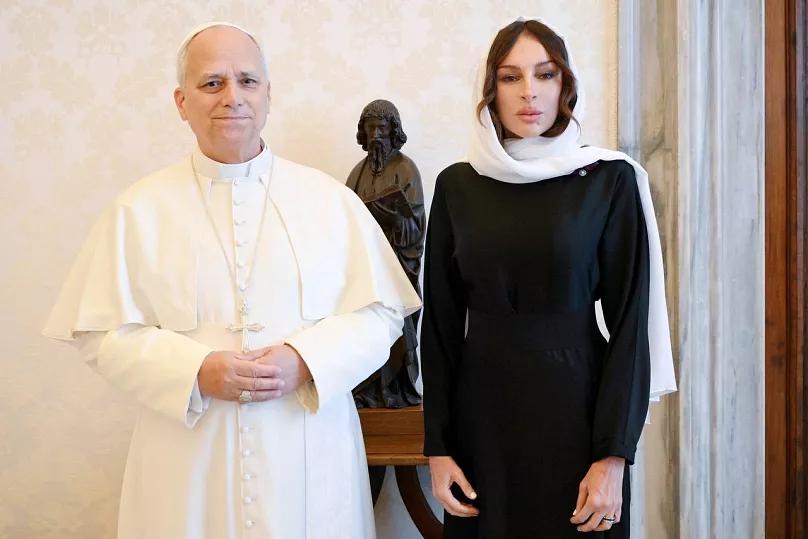Reflections on Mehriban Aliyeva’s Visit Through the Eyes of a Young Azerbaijani Abroad
In today’s rapidly shifting geopolitical and cultural environment, moments of genuine dialogue between civilizations hold unique significance. When leaders of nations come together not merely to discuss policies, but to exchange values, protect shared heritage, and honor spiritual and cultural traditions, the impact extends far beyond diplomatic halls.
As an Azerbaijani student studying in the United States, I witness how global perceptions are shaped not only by political narratives but by cultural actions, humanitarian gestures, and respect for faith and heritage. It is through this lens that the recent official visit of the First Vice-President of Azerbaijan, Mehriban Aliyeva, to the Vatican resonated deeply with me—and, I believe, with many young Azerbaijanis worldwide.
This visit represented far more than international protocol. It was a clear expression of mutual respect, historical awareness, and a shared understanding of humanity’s cultural responsibility.
A Meeting Ground of Faith, History, and Memory
The Vatican is widely regarded as the spiritual heart of the Catholic world, a custodian of centuries of religious and intellectual heritage. The welcome extended to Aliyeva symbolized a recognition of Azerbaijan’s role as a nation that actively preserves multiculturalism, protects religious heritage, and promotes peaceful coexistence.
During her trip, Aliyeva toured sacred ancient sites, studied priceless manuscripts, and held discussions centered on one profound mission: protecting cultural memory in the digital age and passing it to future generations.
A key theme of the visit was the preservation of fragile historical archives and sacred manuscripts through digitization projects—an endeavor that speaks to both responsibility and foresight. By supporting the modernization and safeguarding of such treasures, Azerbaijan has demonstrated not only respect for its own spiritual history, but for global heritage that transcends national boundaries.
A Legacy of Preservation — The Basilica of Saint Paul Outside the Walls
A shining example of this commitment is Azerbaijan’s longstanding support for the restoration of the Basilica of Saint Paul Outside the Walls, one of Christianity’s most historically important landmarks. This contribution goes beyond symbolic diplomacy. It is rooted in the belief that sacred spaces, regardless of geography or creed, belong to all humanity.
In a world where conflict sometimes targets cultural monuments, Azerbaijan’s support for restoring sacred Christian heritage is a powerful message of peace and respect. It is an affirmation that history is shared; that spirituality is universal; and that beauty, once created, deserves to be protected whether it stands in Baku, Jerusalem, or Rome.
Read More: Leading a New Era of Peace: The Curious Case of Azerbaijan
Azerbaijan’s Cultural Diplomacy: A Consistent Path
This visit reflects a long-standing Azerbaijani approach to cultural and spiritual diplomacy, one guided by values rather than rhetoric. It aligns with years of cooperation with UNESCO, intercultural dialogue initiatives, and the preservation of Christian, Jewish, and Islamic heritage throughout Azerbaijan.
The survival and restoration of religious sites across the country — from Orthodox churches in Baku, to synagogues in Quba, to ancient mosques across cultural regions — stands as a living symbol of religious harmony and cultural respect. Azerbaijan’s multicultural identity is not merely historical—it is actively nurtured.
Aliyeva’s work through the Heydar Aliyev Foundation, including global humanitarian and cultural programs, further strengthens this vision. Her activities consistently demonstrate that soft power rooted in education, heritage, and culture can be one of the most powerful diplomatic tools.
Diplomacy Rooted in Human Understanding
While political diplomacy builds frameworks, cultural diplomacy builds trust. Aliyeva’s Vatican visit was a reminder that diplomacy at its highest form is a bridge between hearts and civilizations, not only governments.
It reassures the global community that Azerbaijan is not isolated by geography or faith identity; rather, it stands as a contributor to intercultural harmony, aligned with world efforts to preserve sacred memory and promote peace.
A Young Azerbaijani Voice Abroad
Living and studying in the United States, I often serve — willingly and proudly — as an informal ambassador of my homeland. I explain to classmates where Azerbaijan is on the map, but more importantly, I explain who we are:
a nation of multicultural harmonya crossroads of civilizationsa home where different religions pray under one skya society that values peace, tolerance, and shared culture
When international peers learn that Azerbaijan supports the restoration of major global Christian sites, their curiosity deepens. It prompts meaningful conversations about diversity, shared humanity, and the beauty of cultural respect.
Moments like Aliyeva’s Vatican visit give students like me something powerful to point to — a real example of peace-focused diplomacy in action.
Read More: ‘Even Far Away, I Breathe With My Homeland’ An Azerbaijani Student’s Reflections on Her Country
Carrying Our Heritage Into The World
Young Azerbaijanis studying worldwide feel a responsibility to tell our story accurately and with pride. Not because we are instructed to, but because we have something worth sharing:
a history of coexistence, a culture of respect, and a belief that nations grow stronger through understanding, not division.
Aliyeva’s visit reminded the world — and reminded us — that cultural preservation and interfaith respect are not abstract ideals. They are living values, practiced and strengthened through real action.
A Shared Future
Partnerships like the one between Azerbaijan and the Vatican offer something the modern world urgently needs:
dialogue, not distance; protection, not neglect; connection, not conflict.
They show that a Muslim-majority nation and the heart of the Catholic world can stand together on principles that unite rather than separate humanity.
As young representatives of our country abroad, we proudly carry this message forward. And we do so with the belief that the bridges built today — through respect, culture, and shared spirit — will inspire generations tomorrow.
Meltem Safarli
Meltem Safarli is an Azerbaijani undergraduate student studying in the United States. She is interested in international relations, diplomacy, and global cooperation, writing about how young people experience their homeland from abroad. She can be reached at msafarli@iastate.edu
